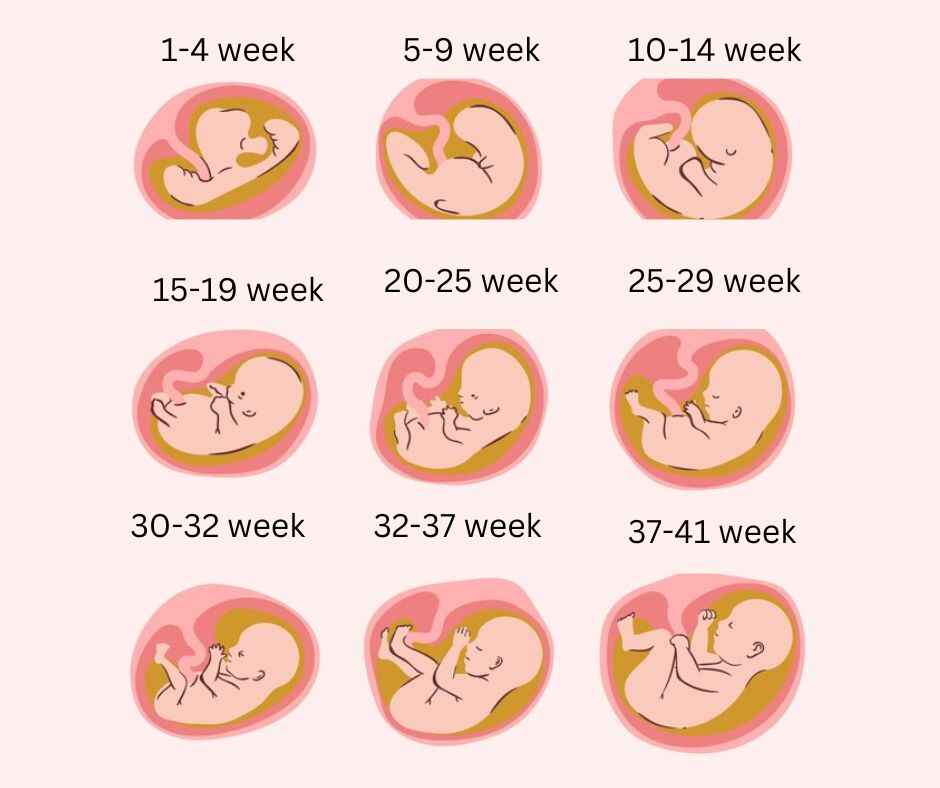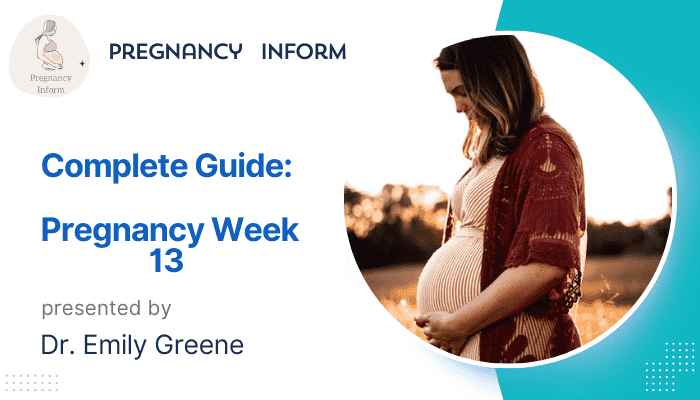Do you want to know about your Pregnancy Week 13 Physical Changes, Symptoms, Baby Development, and Checklist of Things to Do? We cover complete details about the 13th week of pregnancy in this article.
According to pregnancy week 13. You’ve reached the last week of the first trimester at 13 weeks pregnant. We calculate trimesters based on standards set by the American College of Obstetricians and Gynecologists, and according to that, the second trimester will begin next week. By the month, being 13 weeks pregnant places you squarely in the third month, and the fourth month of pregnancy will begin from next week onwards.

Table of Contents
Baby’s Growth at Pregnancy Week 13: What to Expect
Until this point in pregnancy, the fetus’s head was roughly half the size of its entire body. However, starting this week, its head will gradually change shape and begin to proportionally align with the body. By the end of Pregnancy Week 13, the fetus’s head may become about one-third of the body’s size. Comparatively, the size of the fetus in the womb can be likened to a large lemon at this stage. At this time, the fetus’s height is approximately 2.91 inches or 7.4 centimeters, and the weight is around 0.81 ounces or 23 grams. In the coming weeks, mothers can determine the baby’s weight and height through ultrasound.
Until this point in pregnancy, all fetuses generally develop at a similar rate, but from this time onwards, each fetus will continue to grow at its own pace. Some mothers’ growth will be rapid while others may progress a bit more slowly, but all adhere to a certain trajectory and continue to grow, with most fetuses gaining necessary weight and height towards the end of pregnancy.
As we approach week 13, there are quite a few changes occurring in the fetus’s development of its body parts. The fetus has already begun to shed the amniotic fluid through absorption and urination. It then reabsorbs the fluid from its body, recycling it every few hours through the mother’s placenta, where all of the amniotic fluid is constantly being recycled. During this time, the fetus also starts to produce meconium, which accumulates in its intestines. Meconium will be expelled as the baby’s first few bowel movements after birth.
As a sign of the baby’s individuality, their fingerprints will become distinct on their fingers. For female fetuses, the ovaries are already fully formed, while for male fetuses, the testes have already descended. The external parts of the genitalia of the fetus continue to develop in their respective positions. However, they are still so small that gender cannot be clearly determined on ultrasound yet. Tissues in the fetus’s head, hands, and feet gradually transform into bones during this time. From now on, the fetus’s thin skin begins to produce soft, fine hair, known as lanugo. This hair is called lanugo and helps protect the fetus’s skin from the amniotic fluid.
Some fetuses may start sucking their thumbs during this time. Thumb sucking in the womb helps to develop their sucking reflex, which aids the baby in breastfeeding after birth.

Physical changes and symptoms of Week 13 of pregnancy
The development of the placenta continues at this time. However, it is functioning to provide nourishment, oxygen transport, and waste removal for the fetus. Complete formation of the placenta will take another five to seven weeks. By the 13th week, the uterus of the mother begins to rise above the pelvis. Therefore, around this time, pregnant mothers may start to notice a slight increase in the size of their abdomen.
However, it’s important to remember that any lack of change in the size of a mother’s belly is not a cause for concern, as each woman’s physical structure depends on various factors such as hormones, pre-pregnancy weight, the stage of pregnancy, and muscle tone. As the uterus rises, pressure on the bladder decreases.
So, if a mother experiences frequent urination, over time it may decrease. One thing to keep in mind is that pain during urination is not normal. It could be a sign of a urinary tract infection, so if such problems occur, it’s important to inform the doctor. Many pregnant women may experience a reduction in morning sickness or feelings of nausea and vomiting during this time.
Generally, most mothers will begin to feel a bit more energetic. This is why the second trimester is often described as the most comfortable and easy time of pregnancy. However, it’s important to remember that some of these problems may still persist for some women. Research has shown that some mothers may experience morning sickness and fatigue problems until the fourth or fifth month. Conversely, very few mothers may experience them throughout the entire pregnancy.
During this time, the amount of white discharge, known as leukorrhea, may increase. In pregnancy, the level of estrogen hormone increases, which leads to increased blood flow around the vagina. Although this may be unsettling, it has its own benefits. This discharge protects the cervix and vaginal canal from various types of infections and maintains the balance of various bacteria in the genital area. Pregnant women may typically feel discomfort when suddenly changing positions, such as getting up from bed or a chair, coughing, or moving around in bed. This type of discomfort is usually not a cause for concern, but if it is accompanied by fever, chills, or symptoms resembling bleeding, it is important to inform the doctor.
During this time, fluid may be discharged from the mother’s breasts. The fluid that comes out, often yellowish or milky in color, is usually colostrum, also known as pre-milk. It’s common during pregnancy for colostrum to leak, and it’s not something to be overly concerned about. However, if the fluids feel uncomfortable to you, such as if they resemble pus or if you experience pain or any unusual sensations, it’s important to consult your doctor promptly.
From this week onwards, the desire for physical intimacy may intensify. Many women have reported an increased desire to be intimate with their partners during this time. This is due to the release of estrogen hormone and the increased blood circulation in the reproductive system of the mother. Physical intimacy during pregnancy generally does not harm the baby. If the doctor does not advise against it for any reason, there is usually no problem with intimacy during this time.
Week 13 Pregnancy Checklist
During the second trimester, it’s recommended to consume an extra 340 calories per day, and during the third trimester, 450 extra calories are advised. However, if the mother’s weight is significantly higher or lower than normal, calorie intake may need to be adjusted accordingly. Additionally, if there are multiple babies in the womb, a slightly higher calorie intake may be necessary. Therefore, rather than following any fad diets, it’s best to consult with a nutritionist to determine your specific needs.
Due to decreased morning sickness, mothers may experience increased appetite during this time. Between meals, they can try eating fruit salads or vegetables along with light snacks like milk and almonds. Since bone and tooth formation of the baby continues during this time, it’s important to maintain a diet rich in calcium. According to the World Health Organization, a pregnant woman needs 1000 milligrams of calcium-rich food per day, and especially in the last three months, she needs 1200 milligrams daily. Dairy products, fish, almonds, oranges, green leafy vegetables, vegetables, cauliflower, and oilseeds are abundant sources of calcium.
Continue walking, but avoid prolonged standing or sitting. You can start pelvic floor exercises from this time onwards, as these exercises can be very helpful during childbirth. Additionally, preventing problems like difficulty in getting up quickly after childbirth and controlling urine leakage afterward can be quite effective.
During pregnancy, the mother’s natural resistance to disease decreases slightly to protect the fetus. Therefore, a little caution is necessary to combat various bacterial infections during this time. Make it a habit to wash your hands frequently and maintain cleanliness in clothing.
Read Also: Complete Guide to Pregnancy Week 12.
